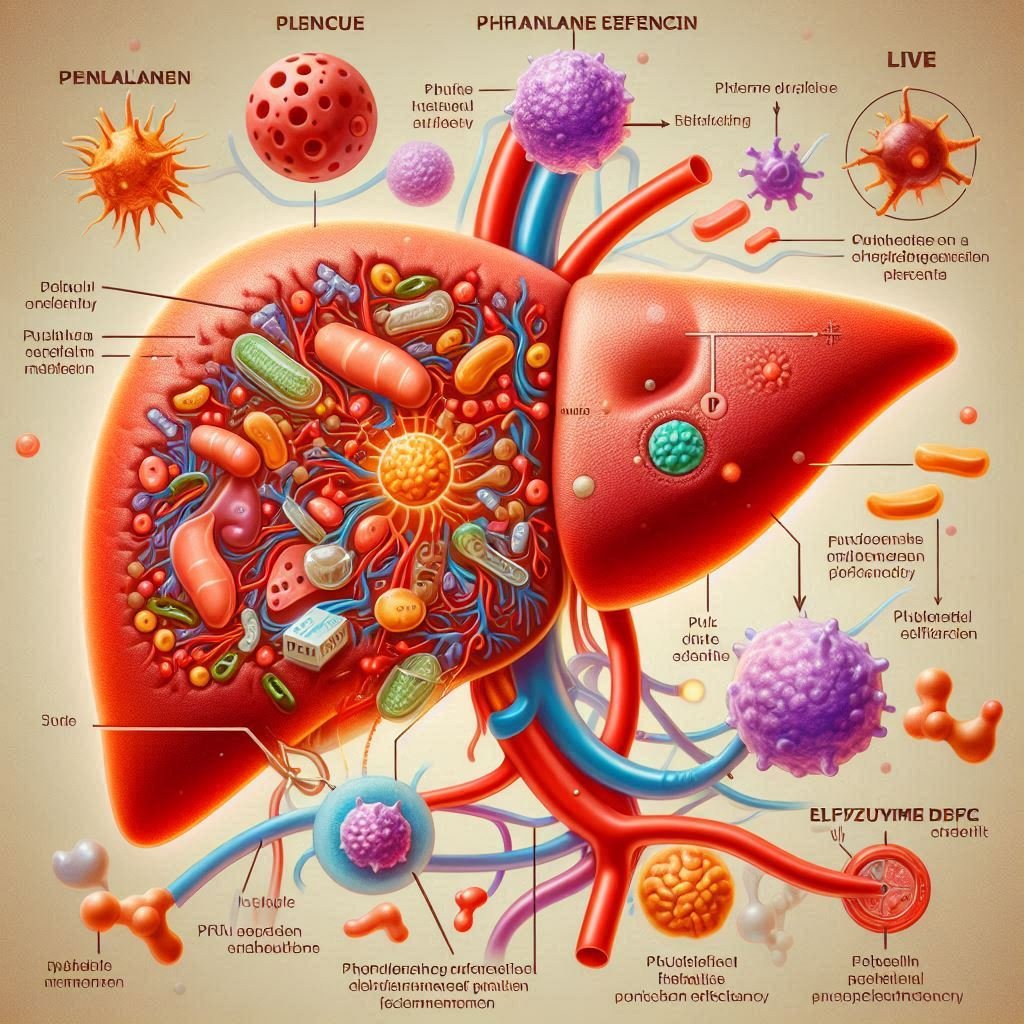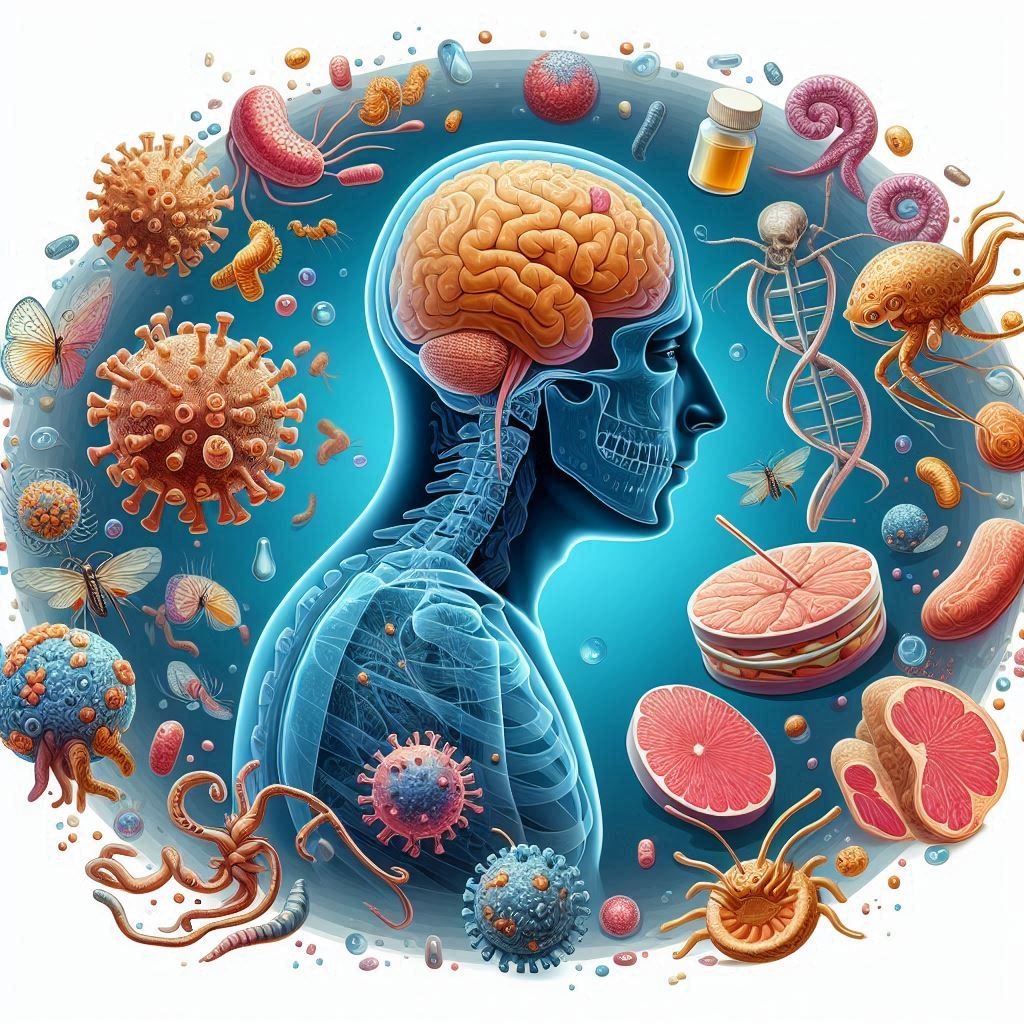Introduction

Phenylketonuria (PKU) is an autosomal recessive trait. It is a rare inherited metabolic disorder where the body cannot break down phenylalanine, an amino acid found in many proteins.
Because phenylketonuria is transmitted in an autosomal recessive form, a person needs to inherit two faulty copies of the gene—one from each parent—in order to become affected. Although they usually do not exhibit symptoms, those who inherit one normal copy of the gene and one mutant copy are carriers of the illness.
The enzyme phenylalanine hydroxylase (PAH), which typically changes phenylalanine into the amino acid tyrosine, is lacking, which explains this incapacity. Consequently, the body builds up phenylalanine, which can eventually reach dangerous amounts and cause a host of health difficulties, such as behavioral problems, developmental delays, seizures, intellectual incapacity, and psychiatric illnesses.
Types of phenylketonuria

- Classic Phenylketonuria: The most severe kind of PKU is identified by extremely low or nonexistent levels of the enzyme phenylalanine hydroxylase (PAH). Classic PKU patients usually have substantial blood phenylalanine accumulation, which, if ignored, can result in severe intellectual impairment, developmental delays, seizures, and other neurological issues.
- Mild Phenylketonuria : Also known as variant PKU or moderate PKU, this form of the condition is less severe than classic PKU. Individuals with mild PKU have some residual PAH enzyme activity, allowing them to metabolize phenylalanine to some extent. As a result, they typically have milder symptoms compared to classic PKU but still require dietary management to prevent phenylalanine buildup and associated complications.
- Hyperphenylalaninemia (HPA): Hyperphenylalaninemia is the term for high blood phenylalanine levels that are not as high as in moderate or classic PKU. It can be caused by a variety of genetic mutations that alter the activity of the PAH enzyme, resulting in a range of symptoms from mild intellectual disability to severe cognitive impairment. While some HPA patients may benefit from dietary measures to avoid neurological problems, others may not require stringent dietary monitoring.
- Maternal Phenylketonuria: When a PKU-afflicted woman gets pregnant without receiving the right care, this is known as maternal PKU. Excessive concentrations of phenylalanine in the mother’s blood might influence fetal development across the placenta, potentially resulting in birth abnormalities, intellectual disabilities, and further issues for the offspring. An very low-phenylalanine diet during and during pregnancy, along with proper management of the mother’s PKU, can greatly lower the likelihood of these
Symptoms
Some common symptoms associated with untreated or poorly managed Phenylketonuria:

- Intellectual disability: High levels of phenylalanine in the blood can lead to cognitive impairment and developmental delays, particularly if the condition is not diagnosed and managed early.
- Behavioral problems: Individuals with untreated Phenylketonuria may exhibit behavioral issues such as hyperactivity, impulsivity, irritability, and difficulty with attention and concentration.
- Seizures: Elevated phenylalanine levels can increase the risk of seizures in individuals with PKU, particularly if the condition is not properly managed.

- Developmental delays: Children with untreated PKU may experience delays in reaching developmental milestones such as sitting, crawling, walking, and speaking.
- Fair skin and hair: Some individuals with PKU may have lighter skin and hair than unaffected family members, although this symptom is not present in all cases.
- Musty odor: Untreated PKU can lead to a distinctive musty or mousy odor in the breath, skin, and urine, due to the accumulation of phenylalanine byproducts.
- Skin conditions: Elevated phenylalanine levels may also contribute to skin problems such as eczema or a rash.
Causes
The primary cause of phenylketonuria (PKU) is mutations in the phenylalanine hydroxylase (PAH) gene. Tyrosine is the amino acid that is produced when the amino acid phenylalanine is converted by PAH. Phenylalanine cannot be digested correctly when there is a lack of PAH enzyme activity brought on by genetic abnormalities. The outcome is an accumulation of phenylalanine in the tissues and blood, which causes PKU symptoms.

The PAH gene is mutated in the majority of PKU cases, although in a small number of cases, mutations encoding other proteins involved in phenylalanine metabolism are also responsible. These comprise genes required for the correct operation of PAH, such as those involved in the manufacture of BH4 (tetrahydrobiopterin) or recycling enzymes.
Diagnosis
Diagnosing PKU typically involves newborn screening, which is performed shortly after birth through a blood test. This screening measures the levels of phenylalanine in the baby’s blood. Elevated phenylalanine levels prompt further diagnostic tests, including genetic testing to confirm the presence of mutations in the PAH gene. Early detection through newborn screening is crucial for initiating treatment and preventing cognitive impairment.
Treatment

- Low-Phenylalanine Diet: This means staying away from high-protein foods that are high in phenylalanine, like meat, fish, eggs, dairy, nuts, and some grains. Rather, people with PKU use medical meals and supplements that are specifically designed to be low in phenylalanine while yet offering enough protein, vitamins, and minerals. These dietary supplements may be protein replacements, low-protein specialty foods, or formula.
- Regular Monitoring: Individuals with PKU require regular monitoring of blood phenylalanine levels to ensure that they remain within the target range. This typically involves frequent blood tests, especially during infancy and childhood when growth and development are critical. Adjustments to the diet or treatment plan may be made based on these blood test results.

- Supplementation: People with PKU may need to take supplements containing particular nutrients that they may not be getting from their diet because the PKU diet limits certain foods. Vitamins, minerals, and other necessary nutrients may be included in this. Furthermore, supplementing with tetrahydrobiopterin (BH4), a cofactor that can assist lower phenylalanine levels in specific PKU cases, may be beneficial for some PKU patients.
- Lifelong Management: PKU is a lifelong condition, and treatment must be continued indefinitely to prevent neurological damage and other complications. Regular follow-up with a metabolic specialist, dietitian, and other healthcare providers is essential for ongoing monitoring and management of PKU.

- New Treatments: In recent years, there have been advancements in PKU treatment, including the development of enzyme substitution therapy and gene therapy approaches aimed at correcting the underlying genetic defect. These emerging treatments offer potential alternatives or complements to the traditional PKU management strategies, although they may not be widely available or suitable for all individuals with PKU.
Challenges and Impact on Quality of Life
- Neurological Impairment: Elevated levels of phenylalanine in the blood can lead to neurological damage, particularly in untreated or poorly managed cases of PKU. This can result in intellectual disability, developmental delays, learning difficulties, and behavioral problems.
- Developmental Delays: Children with PKU may experience delays in reaching developmental milestones such as sitting, crawling, walking, and speaking.
- Cognitive Impairment: PKU can affect cognitive function, including memory, attention, problem-solving, and executive function skills.

- Social and Emotional Challenges: Individuals with PKU may face social and emotional challenges related to their condition, including feelings of isolation, frustration, and low self-esteem.
Research and Future Directions
Despite the challenges associated with PKU, ongoing research offers hope for improved treatment options and outcomes. Gene therapy, enzyme replacement therapy, and pharmacological approaches aimed at restoring phenylalanine metabolism are among the promising avenues being explored. Advances in precision medicine and genetic engineering hold the potential to tailor treatment strategies to individual patients based on their specific genetic mutations and metabolic profiles. Additionally, efforts to enhance newborn screening methods and raise awareness about PKU are crucial for early detection and intervention.
Relation between PKU and pregnancy
Maternal PKU: Women with PKU who become pregnant are at risk of complications related to their condition if it is not properly managed. High levels of phenylalanine in the mother’s blood can cross the placenta and affect fetal development, leading to birth defects, intellectual disability, developmental delays, and other complications in the newborn. This condition is known as maternal PKU.

FAQ (frequently asked question)
Q. What causes PKU?
Ans. PKU is primarily caused by mutations in the gene that encodes the enzyme phenylalanine hydroxylase (PAH), which is responsible for metabolizing phenylalanine. It is inherited in an autosomal recessive pattern.
Q. How is PKU diagnosed?
Ans. PKU is typically diagnosed through newborn screening tests, which detect elevated levels of phenylalanine in the blood. Confirmatory testing involves genetic testing to identify mutations in the PAH gene.
Q. What are the symptoms of PKU?
Ans. Symptoms of PKU can include intellectual disability, developmental delays, behavioral problems, seizures, fair skin and hair, and a musty odor in the breath, skin, and urine.
Q. Is there a cure for PKU?
Ans. Currently, there is no cure for PKU. Treatment focuses on managing the condition through dietary restrictions, supplementation, and regular monitoring to prevent neurological damage and other complications.
Q. Can people with PKU have children?
Ans. Yes, individuals with PKU can have children. However, women with PKU need to carefully manage their condition before and during pregnancy to reduce the risk of complications for both the mother and the baby.
Conclusion
Phenylketonuria remains a formidable challenge in the realm of genetic disorders, impacting individuals and families worldwide. However, with early diagnosis, diligent management, and ongoing research efforts, there is reason to be optimistic about the future. By raising awareness, advancing scientific knowledge, and fostering collaboration among researchers, healthcare professionals, and affected individuals, we can strive towards better outcomes and improved quality of life for those living with PKU.
Table of Contents
Read more about Phenylketonuria
Go and visit dusearchit.in and get more knowledge about others topics.

Pingback: How thalassemia is dangerous blood disorder? symptoms.(2024)
Great post! I learned something new and interesting, which I also happen to cover on my blog. It would be great to get some feedback from those who share the same interest about Airport Transfer, here is my website QN7 Thank you!
thanks a lot!! and please check my site dusearchit.in and i have posted some beneficial topics.
Hi there, I simply couldn’t leave your website without saying that I appreciate the information you supply to your visitors. Here’s mine QU9 and I cover the same topic you might want to get some insights about Cosmetics.
thanks a lot!! please visit my other blogs also.